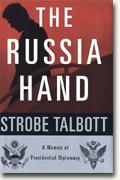The Russia Hand
Strobe Talbott
book reviews:
· general fiction
· chick lit/romance
· sci-fi/fantasy
· graphic novels
· nonfiction
· audio books
· author interviews
· children's books @
curledupkids.com
· DVD reviews @
curledupdvd.com
newsletter
win books
buy online
links
home
for authors
& publishers
for reviewers


|
The Russia Hand: A Memoir of Presidential Diplomacy Strobe Talbott Random House Hardcover 480 pages May 2002 |
|
The major foreign affairs thrust of the period was to manage Russia’s slide to a third-rate power without letting the country revert to an authoritarian, nuclear-armed threat for western civilization. The elder Bush started the psychological care and feeding of Yeltsin; Clinton sacrificed much in the same process. He let the Serbs massacre the Croats and Muslims of Bosnia for two years until finally securing Russian agreement to partition. He put off NATO enlargement—the reassurance of Central Europe and the Baltic states—until Yeltsin won re-election in 1966. He ignored African genocides. And he did not focus on the terrorist threat provided by Muslim fanaticism as perhaps he should have. (Could he have campaigned somehow against the anti-Americanism preached from mosques throughout the Middle East?) But he, Talbott, and others, worked hard on the goal of transmuting Russia. By persuasion, by twisting arms, by influencing the former enemy through state bribes and threats. Their tactical successes were many. Yeltsin pulled his troops out of the Balkan States and let most of the disgruntled nationalities secede. Secretary of Defense William Perry, perhaps the best in that post we’ve had for a long time, persuaded the Russians to disassemble and neutralize nuclear warheads. The IMF loaned major sums for Russian reconstruction that helped turned a communist state into at least a pirate, capitalist one. Holbrook finally negotiated a Bosnian settlement. Russia joined the Partnership for Peace, a new European talking group, and accepted NATO enlargement. And finally, Talbott was key in making Russia stand by while NATO bombed Serbia and took over Kosovo. The American Russia Hands (primarily Talbot and the President) didn’t succeed in having Russia modify the ABM treaty, nor stop it from helping Iran with nuclear technology, nor cease massacring Chechens. But, in the face of a resentful Russian elite that thought the U.S. an ungenerous victor--the Russian Duma even accused America of “international terrorism”--they helped drag Russia into the West. “Russia was a malignancy in remission.” Excising the cancer appears to have been a strategic victory. We read of Russian resentful reactions to America’s bossiness (with amens from the French gallery) despite Clinton’s careful internationalism. Luckily, or due to the style of Clinton and his people, no enraged group of Russian nationalists shipped a suitcase nuke into New York harbor. (A sophisticated and even more deadly version of aircraft bombs.) There were times when civilian control of Moscow was in doubt and a military clash with NATO on the horizon. We should remind ourselves of Cold War fears and be grateful for the change to a soft-spoken Putin and a tamed Russian military that allows us to even place bases in parts of the old Soviet Union. Today, we should probably fear much of the world’s reaction to the current President’s unilateralism. Our culture and imperial superiority have fostered enmity in the Muslim community, and in environmentalists, anti-globalists, and disparate sets of nationalistic, religious, and ethnic groups. No matter how right we are in our values, pursuing our “national interests” abroad should also involve “smoothing international feathers.” Arrogance is always punished. Clinton’s approach to people, so much like Lyndon Johnson’s in its energetic inclusiveness, its warmth, and irresistibleness, is a model that American emperors and proconsuls need to adopt. In the meantime, we should be grateful to Strobe Talbot and his boss. © 2002 by Dean Warren for Curled Up With a Good Book |
|
|
|
 Click here to learn more about this month's sponsor! |
|
| fiction · sf/f · comic books · nonfiction · audio newsletter · free book contest · buy books online review index · links · · authors & publishers reviewers |
|
| site by ELBO Computing Resources, Inc. | |
 The Russia Hand is, as it declares itself to be: a MEMOIR. The book provides neither penetrating character analyses of the personae of those years nor a strategic summary of the Clinton administration’s foreign achievements and failures. Rather, it gives a somewhat bland account of the to and fro of Russian diplomatic activity, of the ups and downs of international argument, and a journalist’s portrayal of the main actors. We see the mercurial and drunken behavior of Yeltsin and the smarmy persuasiveness and cleverness of Clinton. The book will provide a great resource for scholars but adds little profound meat to what we already know. Still, it is smoothly written and contains a fascinating set of insights to recent history.
The Russia Hand is, as it declares itself to be: a MEMOIR. The book provides neither penetrating character analyses of the personae of those years nor a strategic summary of the Clinton administration’s foreign achievements and failures. Rather, it gives a somewhat bland account of the to and fro of Russian diplomatic activity, of the ups and downs of international argument, and a journalist’s portrayal of the main actors. We see the mercurial and drunken behavior of Yeltsin and the smarmy persuasiveness and cleverness of Clinton. The book will provide a great resource for scholars but adds little profound meat to what we already know. Still, it is smoothly written and contains a fascinating set of insights to recent history.